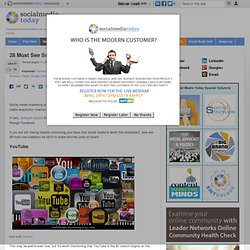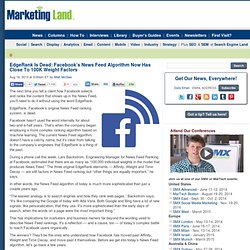

Hashtag Tools That Will Improve Social Media Exposure. These hashtag tools will allow you to use hashtags more effectively. #1: Tagdef.com Tagdef.com will help you find popular #hashtags. You can enter a hashtag term and find out its meaning, date first used and related hashtags (see below). This also lists what is popular, all time high, new tags and top users.
I like to use the popular hashtags to see if my business can relate to any of those. . #2: Hashtags.org Hashtags.org is where you can get deeper analytics of how a certain hashtags were tweeted by the hour in a 24 hour period. The other lesson I see here is it can gauge the best time for your type of audience. . #3: Tagboard.com This tool is so useful for engaging and finding current content! It is easy to engage and share right from Tagboard.com too. The above hashtag tools are so helpful to improve your social media exposure. Connect: Authored by: Janet Johnson Janet is a 13-year veteran of the social media & internet marketing world. See complete profile. Must See Social Media Statistics. Social media marketing is not just a trendy word, it is fast becoming and in some cases already is a viable acquisition channel for most businesses.

In fact, Hubspot reports that 70% of business-to-consumer marketers have acquired a customer through Facebook. If you are still having trouble convincing your boss that social media is worth the investment, here are 28 must see statistics for 2013 to make him/her jump on board. YouTube This may be well-known now, but it's worth mentioning that YouTube is the #2 search engine on the web making it one great resource for traffic and leads. As a matter of fact, Zappos reports that YouTube drove 250,000 visits to its website in 2012. Another resource is an interview that David Siteman Garland with James Wedmore. 1. 700 YouTube video links are shared on Twitter every minute (source: Relevancy Group) 2. 500 years of YouTube videos are watched on Facebook every day (source: Relevancy Group) Facebook.
Choose the Most Effective Social Media Platform for Your Brand. Go where your audience is This is a basic of marketing, digital or not. For example, If you are selling custom hunting bows, you wouldn’t advertise in the Vogue magazine. Instead, you will analyze the reader demographics and psychographics of each magazine to determine which magazines will allow you to best reach your target audience. This same process should be used for determining which social media platforms you should focus the majority of your efforts on. The infographic below from Social Barrel analyzes the audiences that frequent ten of the most popular social media platforms to help you decide where you should focus your efforts. Most Suitable Media Types By Platform To help you understand what to post on these various social media sites, this infographic explains which types of media are most suitable for each social media platform.
What are Your Objectives? Improve SEO Increase traffic to your site Increase brand exposure Improve customer engagement Connect: Authored by: EdgeRank Is Dead: Facebook's News Feed Algorithm Now Has Close To 100K Weight Factors. The next time you tell a client how Facebook selects and ranks the content that shows up in the News Feed, you’ll need to do it without using the word EdgeRank.

EdgeRank, Facebook’s original News Feed ranking system, is dead. Facebook hasn’t used the word internally for about two-and-a-half years. That’s when the company began employing a more complex ranking algorithm based on machine learning. The current News Feed algorithm doesn’t have a catchy name, but it’s clear from talking to the company’s engineers that EdgeRank is a thing of the past. During a phone call this week, Lars Backstrom, Engineering Manager for News Feed Ranking at Facebook, estimated that there are as many as “100,000 individual weights in the model that produces News Feed.” In other words, the News Feed algorithm of today is much more sophisticated than just a couple years ago. “The easiest analogy is to search engines and how they rank web pages,” Backstrom says. The winners? In The Beginning It Was … Turning Knobs.